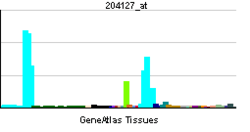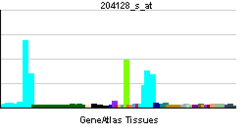RFC3
Replication factor C subunit 3 is a protein that in humans is encoded by the RFC3 gene.[1][2]
The elongation of primed DNA templates by DNA polymerase delta and DNA polymerase epsilon requires the accessory proteins proliferating cell nuclear antigen (PCNA) and replication factor C (RFC). RFC, also named activator 1, is a protein complex consisting of five distinct subunits of 140, 40, 38, 37, and 36 kDa. This gene encodes the 38 kDa subunit. This subunit is essential for the interaction between the 140 kDa subunit and the core complex that consists of the 36, 37, and 40 kDa subunits. Alternatively spliced transcript variants encoding distinct isoforms have been described.[2]
Interactions
RFC3 has been shown to interact with BRD4,[3] CHTF18,[4][5] RFC1,[6][7][8] PCNA[5][9] and RFC4.[6][7]
References
- ↑ Okumura K, Nogami M, Taguchi H, Dean FB, Chen M, Pan ZQ, Hurwitz J, Shiratori A, Murakami Y, Ozawa K et al. (Jul 1995). "Assignment of the 36.5-kDa (RFC5), 37-kDa (RFC4), 38-kDa (RFC3), and 40-kDa (RFC2) subunit genes of human replication factor C to chromosome bands 12q24.2-q24.3, 3q27, 13q12.3-q13, and 7q11.23". Genomics 25 (1): 274–8. doi:10.1016/0888-7543(95)80135-9. PMID 7774928.
- ↑ 2.0 2.1 "Entrez Gene: RFC3 replication factor C (activator 1) 3, 38kDa".
- ↑ Maruyama, Tetsuo; Farina Andrea; Dey Anup; Cheong JaeHun; Bermudez Vladimir P; Tamura Tomohiko; Sciortino Selvaggia; Shuman Jon; Hurwitz Jerard; Ozato Keiko (Sep 2002). "A Mammalian bromodomain protein, brd4, interacts with replication factor C and inhibits progression to S phase". Mol. Cell. Biol. (United States) 22 (18): 6509–20. doi:10.1128/MCB.22.18.6509-6520.2002. ISSN 0270-7306. PMC 135621. PMID 12192049.
- ↑ Bermudez, Vladimir P; Maniwa Yoshimasa; Tappin Inger; Ozato Keiko; Yokomori Kyoko; Hurwitz Jerard (Sep 2003). "The alternative Ctf18-Dcc1-Ctf8-replication factor C complex required for sister chromatid cohesion loads proliferating cell nuclear antigen onto DNA". Proc. Natl. Acad. Sci. U.S.A. (United States) 100 (18): 10237–42. doi:10.1073/pnas.1434308100. ISSN 0027-8424. PMC 193545. PMID 12930902.
- ↑ 5.0 5.1 Merkle, Carolin J; Karnitz Larry M, Henry-Sánchez John T, Chen Junjie (Aug 2003). "Cloning and characterization of hCTF18, hCTF8, and hDCC1. Human homologs of a Saccharomyces cerevisiae complex involved in sister chromatid cohesion establishment". J. Biol. Chem. (United States) 278 (32): 30051–6. doi:10.1074/jbc.M211591200. ISSN 0021-9258. PMID 12766176.
- ↑ 6.0 6.1 Ellison, V; Stillman B (Mar 1998). "Reconstitution of recombinant human replication factor C (RFC) and identification of an RFC subcomplex possessing DNA-dependent ATPase activity". J. Biol. Chem. (UNITED STATES) 273 (10): 5979–87. doi:10.1074/jbc.273.10.5979. ISSN 0021-9258. PMID 9488738.
- ↑ 7.0 7.1 Uhlmann, F; Cai J; Flores-Rozas H; Dean F B; Finkelstein J; O'Donnell M; Hurwitz J (Jun 1996). "In vitro reconstitution of human replication factor C from its five subunits". Proc. Natl. Acad. Sci. U.S.A. (UNITED STATES) 93 (13): 6521–6. doi:10.1073/pnas.93.13.6521. ISSN 0027-8424. PMC 39056. PMID 8692848.
- ↑ Tomida, Junya; Masuda Yuji, Hiroaki Hidekazu, Ishikawa Tomoko, Song Ihnyoung, Tsurimoto Toshiki, Tateishi Satoshi, Shiomi Tadahiro, Kamei Yasuhiro, Kim Jinhyeong, Kamiya Kenji, Vaziri Cyrus, Ohmori Haruo, Todo Takeshi (Apr 2008). "DNA damage-induced ubiquitylation of RFC2 subunit of replication factor C complex". J. Biol. Chem. (United States) 283 (14): 9071–9. doi:10.1074/jbc.M709835200. ISSN 0021-9258. PMC 2431014. PMID 18245774.
- ↑ Ohta, Satoshi; Shiomi Yasushi; Sugimoto Katsunori; Obuse Chikashi; Tsurimoto Toshiki (Oct 2002). "A proteomics approach to identify proliferating cell nuclear antigen (PCNA)-binding proteins in human cell lysates. Identification of the human CHL12/RFCs2-5 complex as a novel PCNA-binding protein". J. Biol. Chem. (United States) 277 (43): 40362–7. doi:10.1074/jbc.M206194200. ISSN 0021-9258. PMID 12171929.
Further reading
- Maruyama K, Sugano S (1994). "Oligo-capping: a simple method to replace the cap structure of eukaryotic mRNAs with oligoribonucleotides.". Gene 138 (1-2): 171–4. doi:10.1016/0378-1119(94)90802-8. PMID 8125298.
- O'Donnell M, Onrust R, Dean FB et al. (1993). "Homology in accessory proteins of replicative polymerases--E. coli to humans.". Nucleic Acids Res. 21 (1): 1–3. doi:10.1093/nar/21.1.1. PMC 309057. PMID 8441605.
- Uhlmann F, Cai J, Flores-Rozas H et al. (1996). "In vitro reconstitution of human replication factor C from its five subunits.". Proc. Natl. Acad. Sci. U.S.A. 93 (13): 6521–6. doi:10.1073/pnas.93.13.6521. PMC 39056. PMID 8692848.
- Uhlmann F, Cai J, Gibbs E et al. (1997). "Deletion analysis of the large subunit p140 in human replication factor C reveals regions required for complex formation and replication activities.". J. Biol. Chem. 272 (15): 10058–64. doi:10.1074/jbc.272.15.10058. PMID 9092549.
- Cujec TP, Cho H, Maldonado E et al. (1997). "The human immunodeficiency virus transactivator Tat interacts with the RNA polymerase II holoenzyme.". Mol. Cell. Biol. 17 (4): 1817–23. PMC 232028. PMID 9121429.
- Cai J, Gibbs E, Uhlmann F et al. (1997). "A complex consisting of human replication factor C p40, p37, and p36 subunits is a DNA-dependent ATPase and an intermediate in the assembly of the holoenzyme.". J. Biol. Chem. 272 (30): 18974–81. doi:10.1074/jbc.272.30.18974. PMID 9228079.
- Suzuki Y, Yoshitomo-Nakagawa K, Maruyama K et al. (1997). "Construction and characterization of a full length-enriched and a 5'-end-enriched cDNA library.". Gene 200 (1-2): 149–56. doi:10.1016/S0378-1119(97)00411-3. PMID 9373149.
- Ellison V, Stillman B (1998). "Reconstitution of recombinant human replication factor C (RFC) and identification of an RFC subcomplex possessing DNA-dependent ATPase activity.". J. Biol. Chem. 273 (10): 5979–87. doi:10.1074/jbc.273.10.5979. PMID 9488738.
- Zhang G, Gibbs E, Kelman Z et al. (1999). "Studies on the interactions between human replication factor C and human proliferating cell nuclear antigen.". Proc. Natl. Acad. Sci. U.S.A. 96 (5): 1869–74. doi:10.1073/pnas.96.5.1869. PMC 26703. PMID 10051561.
- Rauen M, Burtelow MA, Dufault VM, Karnitz LM (2000). "The human checkpoint protein hRad17 interacts with the PCNA-like proteins hRad1, hHus1, and hRad9.". J. Biol. Chem. 275 (38): 29767–71. doi:10.1074/jbc.M005782200. PMID 10884395.
- Lindsey-Boltz LA, Bermudez VP, Hurwitz J, Sancar A (2001). "Purification and characterization of human DNA damage checkpoint Rad complexes.". Proc. Natl. Acad. Sci. U.S.A. 98 (20): 11236–41. doi:10.1073/pnas.201373498. PMC 58713. PMID 11572977.
- Griffith JD, Lindsey-Boltz LA, Sancar A (2002). "Structures of the human Rad17-replication factor C and checkpoint Rad 9-1-1 complexes visualized by glycerol spray/low voltage microscopy.". J. Biol. Chem. 277 (18): 15233–6. doi:10.1074/jbc.C200129200. PMID 11907025.
- Ohta S, Shiomi Y, Sugimoto K et al. (2002). "A proteomics approach to identify proliferating cell nuclear antigen (PCNA)-binding proteins in human cell lysates. Identification of the human CHL12/RFCs2-5 complex as a novel PCNA-binding protein.". J. Biol. Chem. 277 (43): 40362–7. doi:10.1074/jbc.M206194200. PMID 12171929.
- Maruyama T, Farina A, Dey A et al. (2002). "A Mammalian bromodomain protein, brd4, interacts with replication factor C and inhibits progression to S phase.". Mol. Cell. Biol. 22 (18): 6509–20. doi:10.1128/MCB.22.18.6509-6520.2002. PMC 135621. PMID 12192049.
- Strausberg RL, Feingold EA, Grouse LH et al. (2003). "Generation and initial analysis of more than 15,000 full-length human and mouse cDNA sequences.". Proc. Natl. Acad. Sci. U.S.A. 99 (26): 16899–903. doi:10.1073/pnas.242603899. PMC 139241. PMID 12477932.
- Merkle CJ, Karnitz LM, Henry-Sánchez JT, Chen J (2003). "Cloning and characterization of hCTF18, hCTF8, and hDCC1. Human homologs of a Saccharomyces cerevisiae complex involved in sister chromatid cohesion establishment.". J. Biol. Chem. 278 (32): 30051–6. doi:10.1074/jbc.M211591200. PMID 12766176.
- Bermudez VP, Maniwa Y, Tappin I et al. (2003). "The alternative Ctf18-Dcc1-Ctf8-replication factor C complex required for sister chromatid cohesion loads proliferating cell nuclear antigen onto DNA.". Proc. Natl. Acad. Sci. U.S.A. 100 (18): 10237–42. doi:10.1073/pnas.1434308100. PMC 193545. PMID 12930902.
- Zou L, Liu D, Elledge SJ (2004). "Replication protein A-mediated recruitment and activation of Rad17 complexes.". Proc. Natl. Acad. Sci. U.S.A. 100 (24): 13827–32. doi:10.1073/pnas.2336100100. PMC 283506. PMID 14605214.
- Ota T, Suzuki Y, Nishikawa T et al. (2004). "Complete sequencing and characterization of 21,243 full-length human cDNAs.". Nat. Genet. 36 (1): 40–5. doi:10.1038/ng1285. PMID 14702039.

